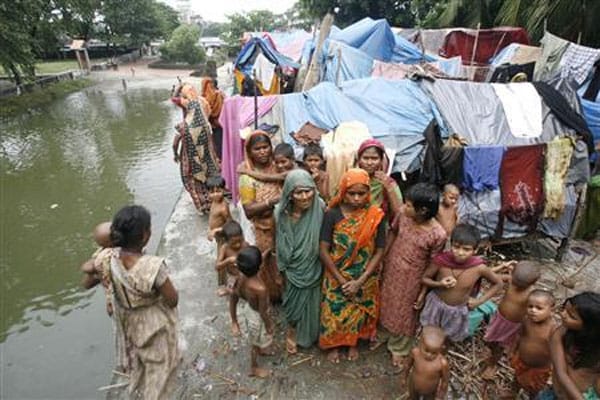
This year’s monsoon rains were the worst seen in Bangladesh in many years: flash floods killed scores of people and left hundreds of thousands homeless. But appalling as the immediate damage is, the aftermath is worse, as the resulting poverty and debt condemns a generation of children to malnutrition.
The following are excerpts from an article by Syed Zain Al-Mahmood, an investigative reporter based in Dhaka, Bangladesh. It was published in the Guardian, on August 23, 2012.
+++
Vulnerable families coping with the destruction of their homes, unsafe drinking water and reduced calorie consumption are faced with crippling interest rates – ranging from 21-67% – charged by local loan sharks.
“The farmers who sell their cattle won’t be able to buy them back,” said Rezaul Haque, who works for local NGO Practical Action. “They will have difficulty ploughing the fields next year. Many will end up migrating to the cities and joining the ranks of the urban poor.”
In the aftermath of floods, reducing the quality and quantity of food intake becomes a common practice, which has a negative effect on the nutritional status of people, especially young children.
+++
According to a survey carried out in the flood-prone north-east districts of Bangladesh, two-thirds of households short of food often have to buy food on credit or borrow from other families; more than 90% sometimes reduce the size of their meals, and close to 60% sometimes skip a meal altogether. Data on child malnutrition shows that the region is substantially worse off than Bangladesh as a whole: 55% of children under five years old are underweight, compared with a national average of 41%.
+++
After severe flooding in 1998, studies showed that a child living in a household exposed to the floods faced a seven times greater risk of wasting – low weight for height – than one not exposed at all. Many children never recovered to pre-flood levels of health.
Poor sanitation, lack of food, water-borne diseases and loss of family income all contribute to increased malnutrition among children during floods. Experts say the destruction of home gardens is particularly harmful, because vegetables represent the most important source of micronutrients in the diet.
+++
Fishing used to be an important economic activity and a critical source of protein for the people of the flood plains. But these days, that option no longer exists. “The rivers and lakes are off limits to us because the government has leased them out to big contractors,” says Mili’s father, Kalam Mia. “We can’t catch fish any more. So if the crops fail due to a flood, we have to starve.”


